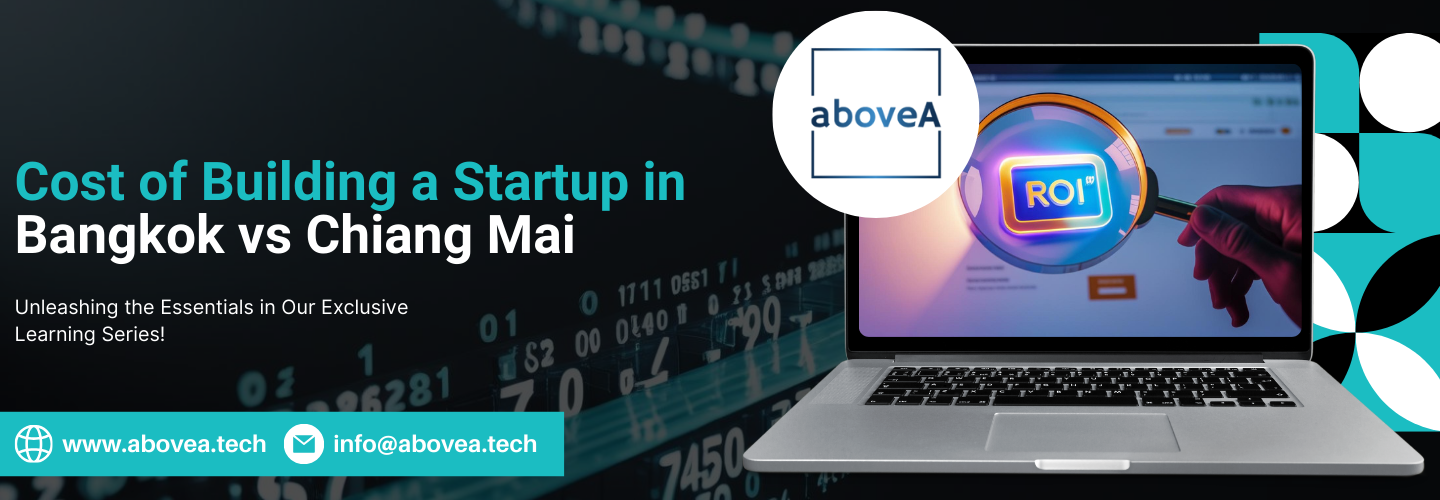

Faustas Norvaisa
A Growth & Product Expert with 9 years of experience in revenue diversification, international expansion, SEO, and digital marketing. Passionate about scaling businesses and building global brands, he empowers companies to thrive with his motto, "sharing is caring.
The Real Cost of Building a Startup in Bangkok vs Chiang Mai
The real cost of building a startup in Bangkok vs Chiang Mai in 2025 is more than just rent and salaries. Founders must consider living expenses, access to talent, investor networks, and lifestyle trade-offs. Bangkok offers visibility, speed, and corporate connections, while Chiang Mai provides affordability, creativity, and a slower pace that attracts digital entrepreneurs.
This article breaks down the financial and non-financial costs of both cities, helping founders decide where to launch. From office space to investor access, we’ll explore what matters most for long-term growth and survival in Thailand’s dynamic startup ecosystem.
Cut costs, not growth. Scale smarter with aboveA support.
Table of Contents
The Startup Landscape in Bangkok vs Chiang Mai
The startup landscape in Bangkok vs Chiang Mai in 2025 shows two very different paths for founders. Bangkok has become Thailand’s central startup hub, hosting global accelerators, venture capital firms, and government-backed innovation programs. It attracts fintech, HealthTech, and e-commerce founders who want direct access to investors and partners.
Chiang Mai, on the other hand, is known as Thailand’s creative capital. It appeals to digital nomads, bootstrapped founders, and early-stage startups that value lifestyle, lower costs, and strong community-driven ecosystems. Co-working spaces are everywhere, and the city thrives on collaboration.
In 2025, Bangkok dominates in funding availability and corporate connections, while Chiang Mai excels in affordability and work-life balance. Both ecosystems are growing, but serve different needs. Startups that prioritize visibility and fast scaling lean toward Bangkok, while those seeking sustainability and creativity often choose Chiang Mai.
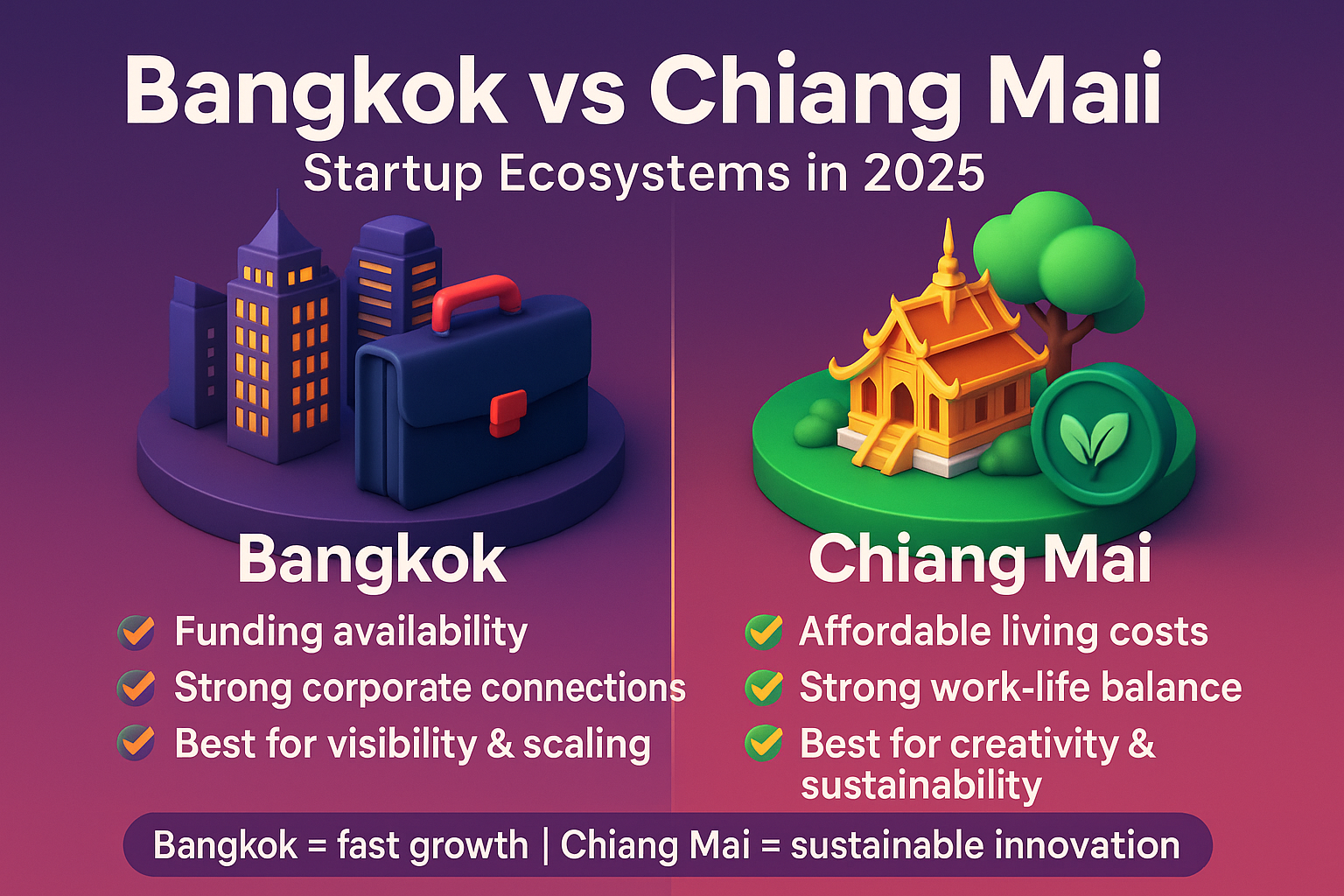
According to a 2025 StartupBlink report, Bangkok ranks among the top startup cities in Southeast Asia, while Chiang Mai continues to climb in the global index as a rising alternative hub. This means founders now face a strategic choice: pay the higher cost for speed and connections in Bangkok, or enjoy lower costs and lifestyle benefits in Chiang Mai while building more gradually.
Office Space and Infrastructure Costs
Office space and infrastructure costs in Bangkok vs Chiang Mai are among the most prominent factors founders must weigh. In Bangkok, Grade A office towers dominate the skyline, with world-class facilities but premium prices. Co-working hubs like WeWork, The Hive, and JustCo cater to startups, but they often charge higher rates due to prime locations and demand from corporate clients.
Chiang Mai, however, thrives on affordability. The city is filled with co-working spaces like Punspace, Hub53, and smaller boutique hubs. Internet speeds are reliable, utilities are cheaper, and overall infrastructure costs are far lower compared to the capital. While Bangkok provides prestige and proximity to corporate clients, Chiang Mai provides flexibility and long-term affordability.
Here’s a breakdown of estimated 2025 costs:
| Expense Category | Bangkok (Monthly Average) | Chiang Mai (Monthly Average) |
|---|---|---|
| Co-working Desk | $180 – $300 | $80 – $150 |
| Private Office (Small) | $900 – $1,500 | $400 – $700 |
| Utilities (Electricity, Water, Internet) | $200 – $350 | $100 – $200 |
| High-Speed Internet | $50 – $80 | $30 – $50 |
| Meeting Room Access | Often extra ($20/hr) | Often included in packages |
For founders, Bangkok offers visibility and premium infrastructure, albeit at a higher burn rate. Chiang Mai reduces fixed costs, freeing budget for marketing, product, and team building. The choice depends on whether prestige or savings matter more for the stage of growth.
Talent and Hiring Expenses
Talent and hiring expenses in Bangkok vs Chiang Mai highlight the trade-offs founders face in 2025. Bangkok provides the deepest talent pool, with more specialists in software, finance, and marketing, but salaries are higher. A mid-level software developer in Bangkok may cost $1,500–$2,000 per month plus benefits. Chiang Mai offers lower wages, averaging 20–30% less, but the pool for advanced technical roles is smaller.
Here’s a snapshot of hiring costs in both cities:
| Role | Bangkok (Monthly Salary) | Chiang Mai (Monthly Salary) |
|---|---|---|
| Junior Developer | $800 – $1,200 | $600 – $900 |
| Mid-Level Developer | $1,500 – $2,000 | $1,000 – $1,500 |
| Senior Software Engineer | $2,500 – $3,500 | $1,800 – $2,500 |
| Digital Marketing Manager | $1,200 – $1,800 | $900 – $1,300 |
| Graphic Designer | $700 – $1,200 | $500 – $800 |
| Administrative Staff | $500 – $800 | $350 – $600 |
Recruitment speed also differs. Bangkok startups benefit from established HR agencies, career fairs, and university pipelines, allowing faster access to talent. Chiang Mai relies more on community-driven networks and co-working connections, which may take longer but often lead to more loyal hires.
For global startups, Bangkok attracts expats with high salaries, while Chiang Mai appeals to digital nomads for short-term roles. The real cost is not only salaries but also the time spent on retention and recruitment.
Cost of Living for Founders and Teams
When calculating the cost of living for founders and teams in Bangkok vs Chiang Mai, the differences are significant. Living expenses can directly influence team satisfaction, talent retention, and overall business runway. In 2025, both cities will remain attractive compared to global hubs like Singapore or Hong Kong, but Bangkok is far pricier than Chiang Mai.
Bangkok: Higher Costs, More Access
Bangkok’s cost of living is higher across housing, food, and transportation. A central apartment in Sukhumvit or Sathorn can easily cost $800–$1,500 per month. Dining ranges from cheap street food at $2–$3 per meal to fine dining that rivals prices in Western cities. Transportation costs add up quickly, with BTS and MRT fares averaging $40–$60 monthly, and taxis or ride-hailing services adding another $100–$200.
For startups with teams in Bangkok, the upside is access to international schools, hospitals, and luxury amenities that attract global talent. Expats often prefer Bangkok for its cosmopolitan environment, even though it comes at a premium.
Here’s a breakdown of monthly living expenses for Bangkok in 2025:
Rent (1-bedroom, central area): $800–$1,500
Utilities (electricity, water, internet): $120–$200
Food (mix of local and dining out): $300–$600
Transportation (public + ride-hailing): $150–$250
Coworking membership (individual): $180–$300
Entertainment & extras: $200–$400
On average, a single team member may spend $1,800–$3,000 per month in Bangkok.
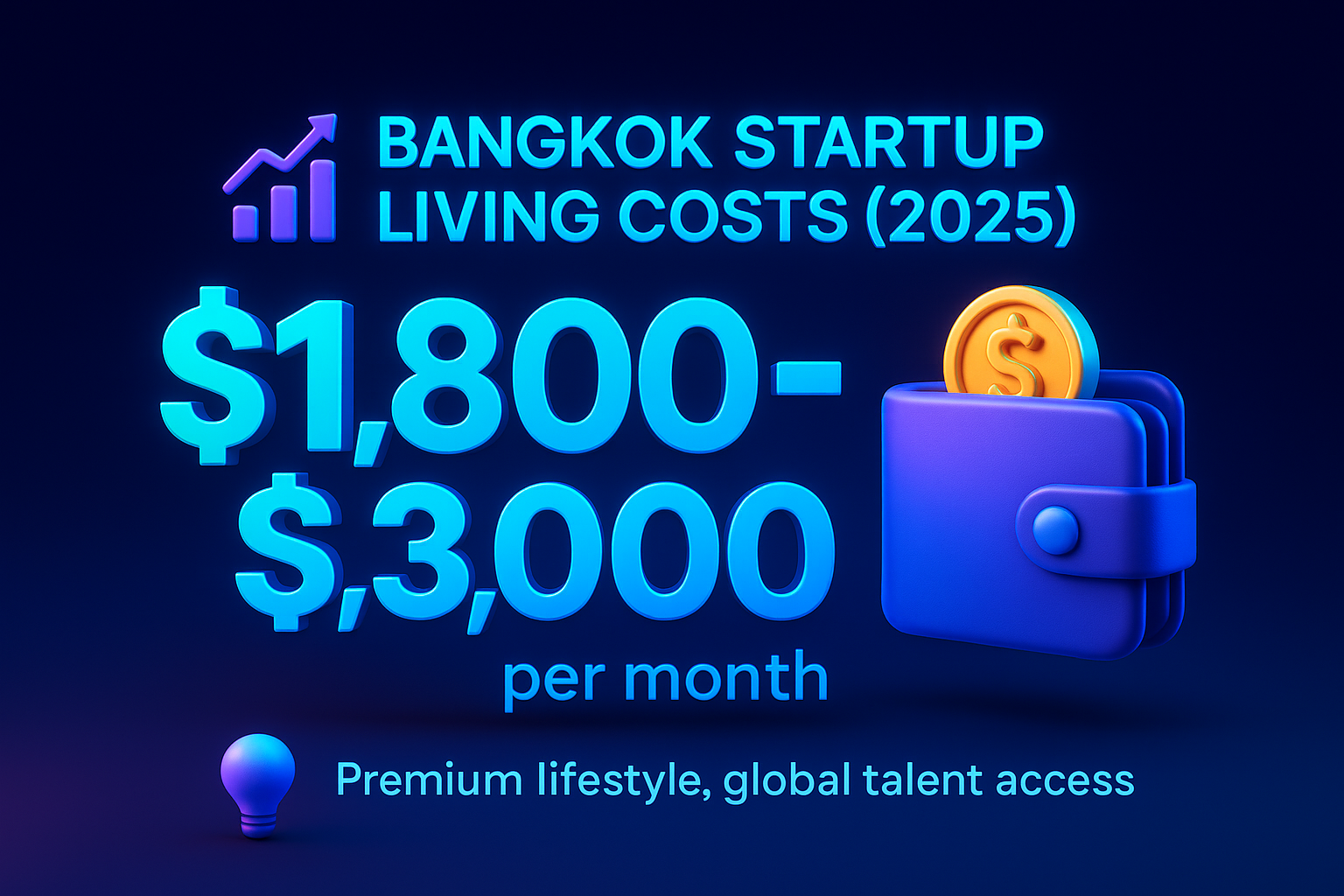
Chiang Mai: Affordable Lifestyle, Strong Community
Chiang Mai offers an entirely different cost profile. Rent for a modern apartment close to Nimmanhaemin can range from $300–$600 per month, less than half of Bangkok’s equivalent. Utilities are cheaper, averaging $70–$120. Food costs remain low, with local meals priced at $1–$2 and plenty of healthy, organic options favored by the city’s creative community.
Transport is another advantage. Chiang Mai has no BTS or MRT, but motorcycles and bicycles dominate. Monthly transportation costs often stay under $80, unless ride-hailing is used frequently. Coworking spaces are abundant, priced at $80–$150 monthly, and many include amenities like meeting rooms and community events.
Here’s a breakdown of monthly living expenses for Chiang Mai in 2025:
Rent (1-bedroom, central area): $300–$600
Utilities (electricity, water, internet): $70–$120
Food (local + healthy cafes): $200–$400
Transportation (bike, rideshare, local transport): $50–$80
Coworking membership (individual): $80–$150
Entertainment & extras: $100–$200
On average, a single team member may spend $800–$1,500 per month in Chiang Mai.
While Chiang Mai lacks Bangkok’s corporate infrastructure, its affordability attracts startups aiming to extend their runway. The lifestyle also encourages work-life balance, which can improve long-term team retention. For early-stage founders, Chiang Mai offers a space to experiment without depleting capital.
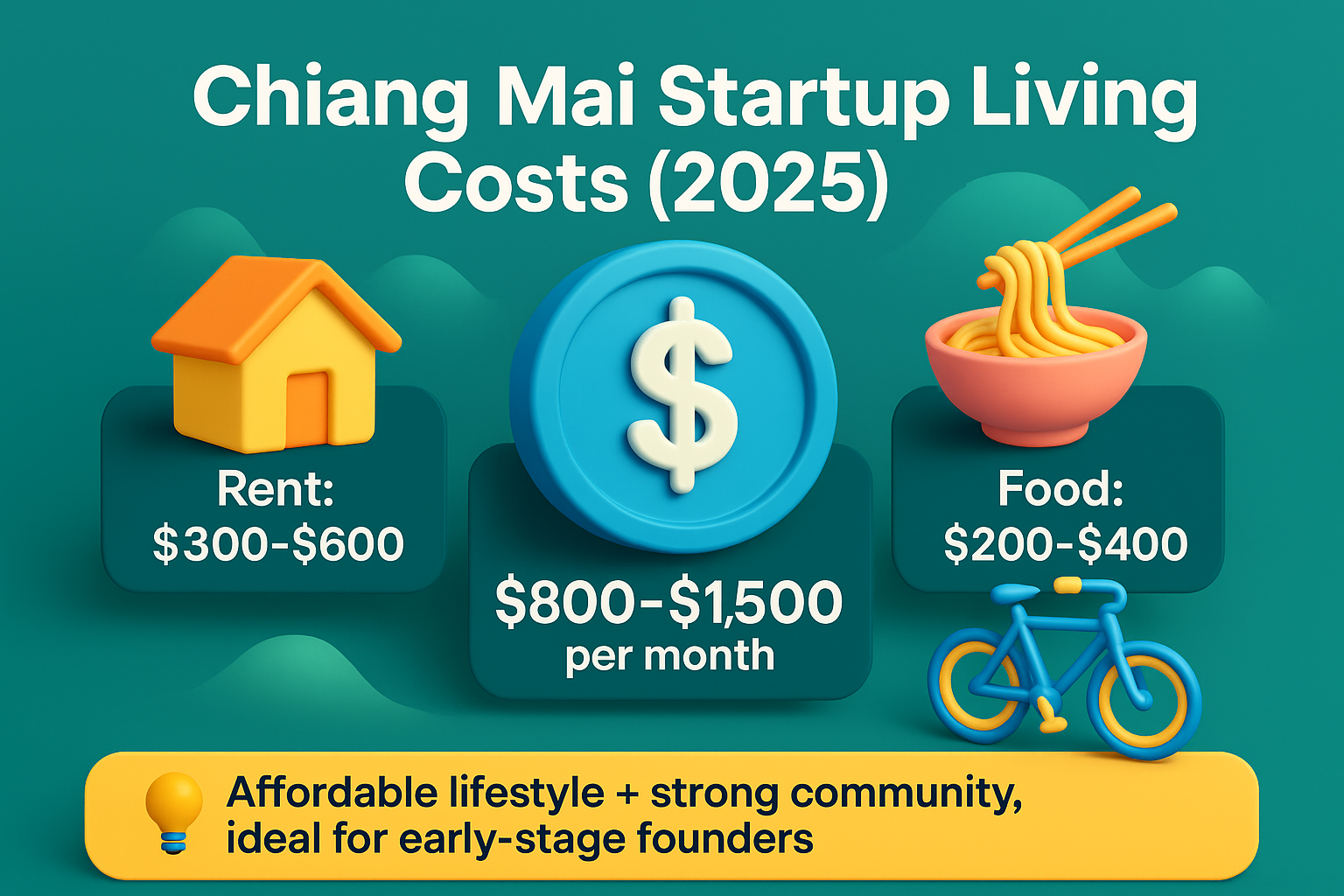
Access to Investors and Funding Networks
Access to investors and funding networks in Bangkok vs Chiang Mai is often the deciding factor for where startups choose to base themselves. In 2025, Bangkok remains the financial hub of Thailand and Southeast Asia, attracting venture capital firms, angel investors, and accelerator programs. Chiang Mai, while growing as a creative ecosystem, still lags behind when it comes to investor visibility.
Bangkok startups benefit from direct access to venture capital firms, corporate innovation funds, and government-backed programs like Startup Thailand and BOI incentives. Events such as Techsauce Global Summit, Bangkok Venture Club meetups, and international startup competitions bring global VCs into the city. This means that raising Series A or scaling funding is far more realistic in Bangkok.
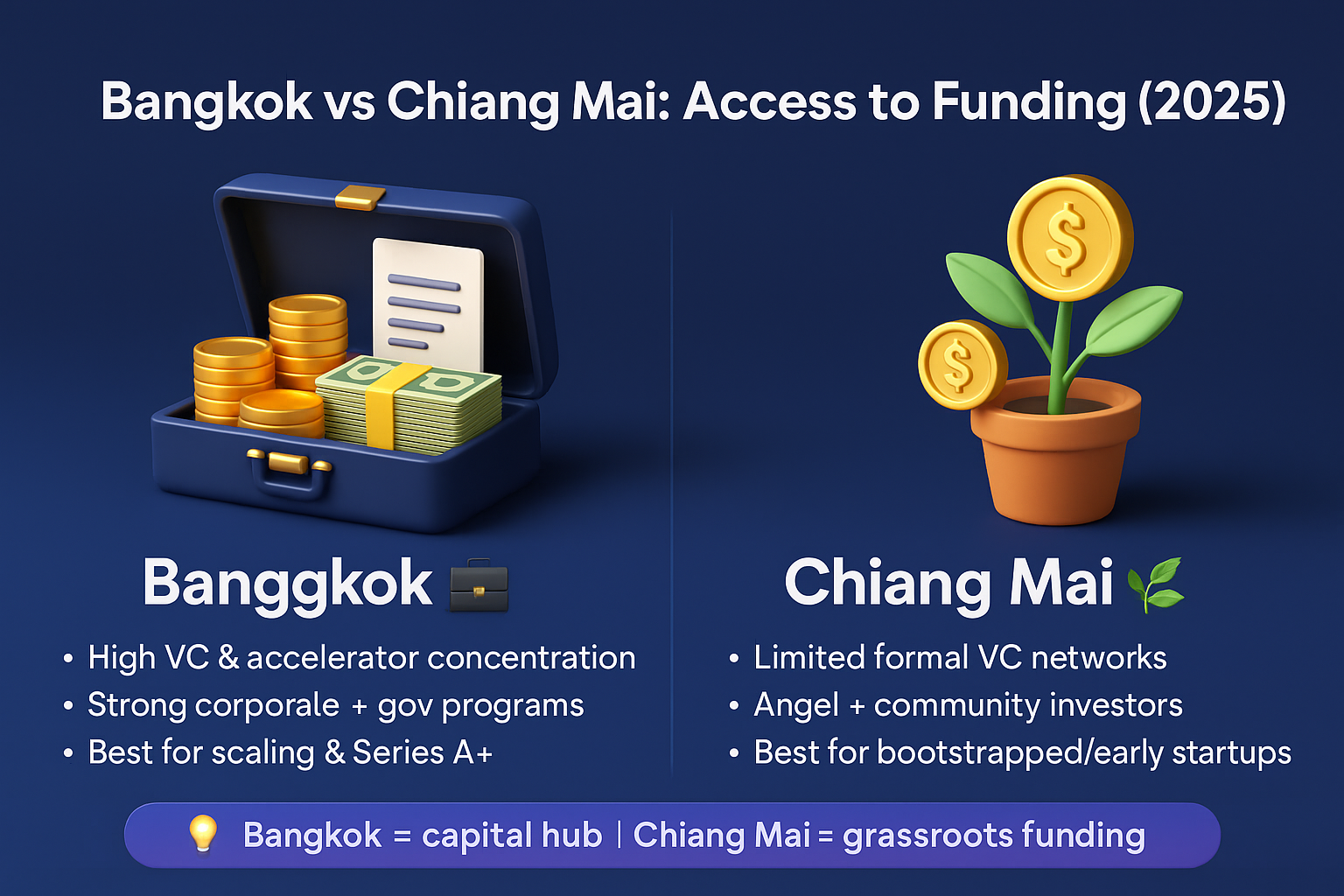
Chiang Mai has a different appeal. The city is known for its grassroots funding ecosystem, including angel investors focused on lifestyle, wellness, and creative startups. International digital nomads also occasionally act as seed investors for small-scale businesses. However, Chiang Mai startups seeking larger funding often have to travel to Bangkok or pitch virtually to gain traction with major funds.
Key differences founders must note when comparing Bangkok vs Chiang Mai startup funding in 2025:
Bangkok: High concentration of VC firms, accelerators, and corporate investors. Best for startups aiming at rapid scale.
Chiang Mai: Limited access to formal venture networks. Better suited for bootstrapped startups or those seeking early-stage angel investment.
Bangkok: Strong government support through grants, tax incentives, and official startup zones.
Chiang Mai: Heavy reliance on community-driven investor networks, often informal.
For international investors, Bangkok is often the first point of entry into Thailand’s startup ecosystem, making visibility easier for founders. Chiang Mai still holds potential, but startups based there need a strong digital presence or hybrid strategies to compete for funding.
Lifestyle Trade-Offs for Founders and Teams
When comparing Bangkok vs Chiang Mai for startup founders and teams in 2025, lifestyle is more than a personal preference; it directly affects productivity, retention, and company culture. Each city offers unique trade-offs that influence how founders work, how teams collaborate, and how long employees stay committed.
Bangkok: Fast-Paced, Connected, and Competitive
Bangkok offers a fast-paced, highly connected environment for startup founders. The city never sleeps, with constant networking events, industry meetups, and investor gatherings. This means founders in Bangkok have continuous exposure to opportunities, but also face higher stress levels and more competition.
For teams, Bangkok offers world-class amenities, international schools, and global-standard healthcare, making it an attractive destination for expat hires. The downside is the hustle culture, heavy traffic, and higher living costs, which can lead to faster burnout. Startups that thrive in competitive environments often find Bangkok the best fit.
Chiang Mai: Relaxed, Affordable, and Community-Driven
Chiang Mai delivers the opposite lifestyle – a slower pace, affordability, and strong community support. Founders who choose Chiang Mai often cite work-life balance, natural surroundings, and creative inspiration as top benefits. Employees appreciate lower rents, healthier lifestyles, and the ability to save more on the same salary.
For teams, Chiang Mai offers a close-knit startup scene, where collaboration and mentorship often come more naturally than in Bangkok’s corporate-heavy culture. However, the quieter pace means fewer large-scale networking events, and scaling businesses may find themselves flying to Bangkok frequently for deals or pitches.
Which Lifestyle Suits Startups Best?
The lifestyle trade-offs between Bangkok and Chiang Mai ultimately depend on the startup’s goals. Bangkok is ideal for founders who prioritize speed, access to investors, and global exposure. Chiang Mai is better for startups seeking affordability, team loyalty, and creative energy.
For global talent, Bangkok is easier to adapt to due to its international community, while Chiang Mai attracts digital nomads and remote-first teams who value freedom. Choosing between the two is a balancing act: one maximizes visibility, the other maximizes sustainability.
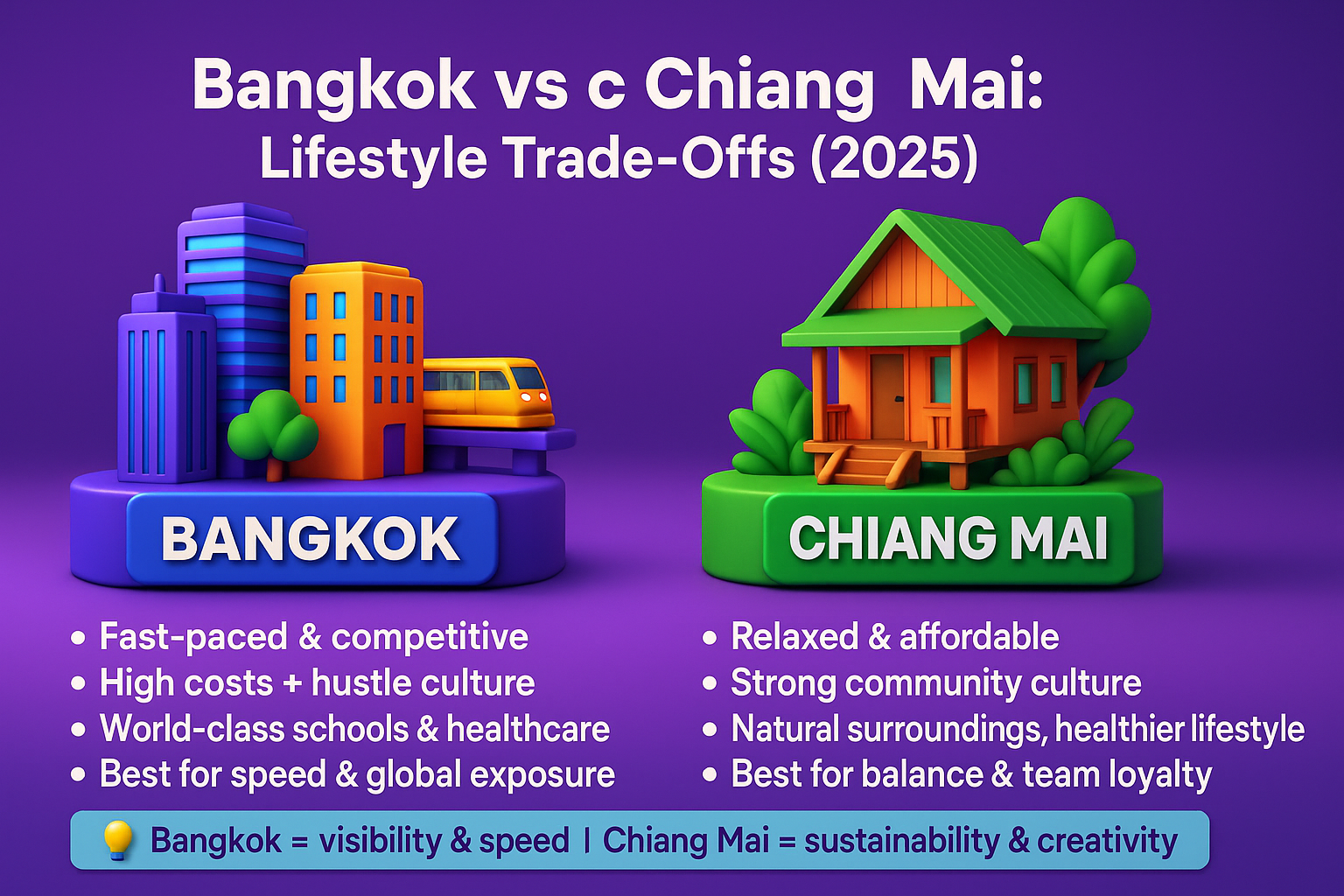
Marketing and Customer Acquisition Costs in Bangkok vs Chiang Mai
Marketing and customer acquisition costs in Bangkok vs Chiang Mai are one of the biggest factors shaping startup growth in 2025. Where you launch directly impacts advertising costs, agency fees, and long-term CAC.
Bangkok: Higher Costs, Bigger Reach
In Bangkok, startup marketing budgets are significantly higher. Paid ads on Google and Meta platforms face intense competition from corporations and venture-backed startups. Cost-per-click in Bangkok can be 30-40% higher than in Chiang Mai, especially in verticals like fintech, SaaS, and e-commerce. This drives up customer acquisition costs and makes campaigns harder to sustain.
Bangkok agencies also charge premium fees, often focusing on short-term ad campaigns without building sustainable lead generation systems. Startups may gain visibility but struggle with ROI if conversions lag.
The advantage is scale. With Bangkok’s larger consumer market, international visibility, and deep investor ecosystem, startups can test, refine, and expand faster. This makes it the best choice for founders prioritizing rapid customer acquisition, brand reach, and fundraising momentum.
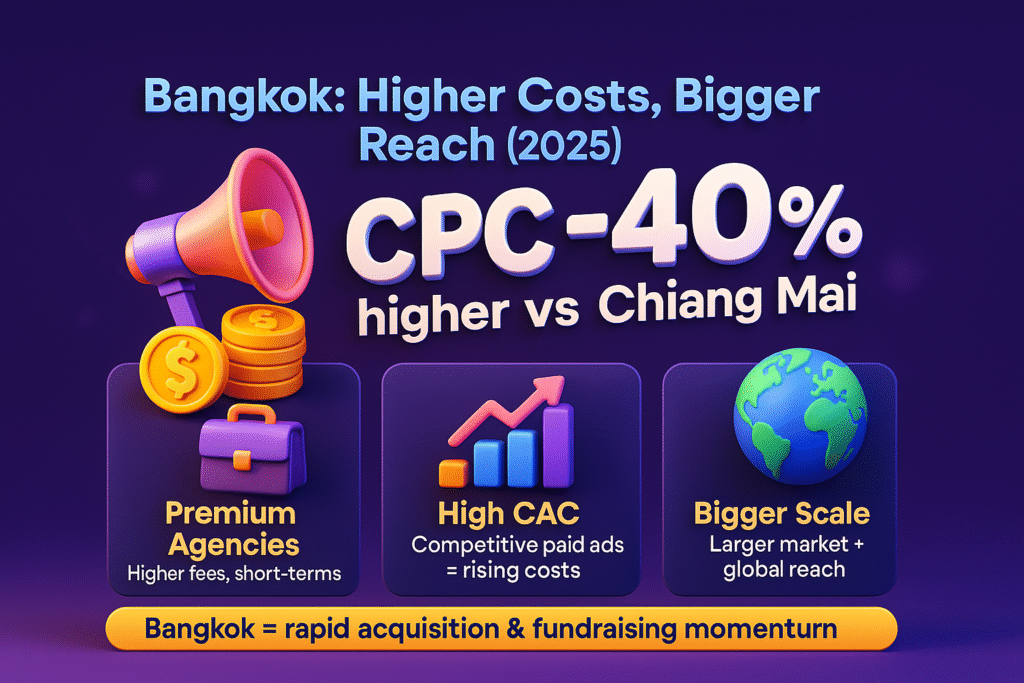

Chiang Mai: Lean Marketing, Niche Wins
In Chiang Mai, digital marketing costs are lower. Founders benefit from cheaper CPCs, affordable influencer collaborations, and reduced competition in paid ads. This allows startups to stretch budgets further while maintaining visibility.
Chiang Mai shines in niche industries like wellness, eco-products, and creative ventures. Founders can rely on organic SEO growth, community referrals, and content marketing strategies instead of heavy ad spend. While reach is smaller compared to Bangkok, loyalty and retention often offset the difference.
Local agencies may lack global experience, but partners like aboveA close this gap by delivering international SEO, conversion-focused marketing systems, and automation tools. This ensures startups in Chiang Mai achieve global reach without Bangkok’s overhead costs.
Chiang Mai is best suited for startups focused on sustainable CAC models, where efficiency, lean marketing, and long-term growth matter more than aggressive spending.
Long-Term Scalability and Exit Potential
Long-term scalability and exit potential in Bangkok vs Chiang Mai are among the most critical factors founders must evaluate in 2025. While both cities provide fertile ground for startups, their capacity to support scale and facilitate exits differs dramatically.
Bangkok: Gateway to Scale and Exits
Bangkok remains the primary gateway for scaling startups in Thailand. The city’s concentration of multinational corporations, corporate venture arms, and global accelerators makes it the natural choice for founders planning international expansion. Series A, Series B, and later-stage funding rounds are almost exclusively concentrated in Bangkok, supported by local and regional VC firms.
For exit potential, Bangkok hosts IPO-ready infrastructure through the Stock Exchange of Thailand (SET) and attracts acquisition interest from multinational companies seeking a foothold in Southeast Asia. Founders who envision mergers, acquisitions, or IPO exits will find more pathways in Bangkok than anywhere else in Thailand.
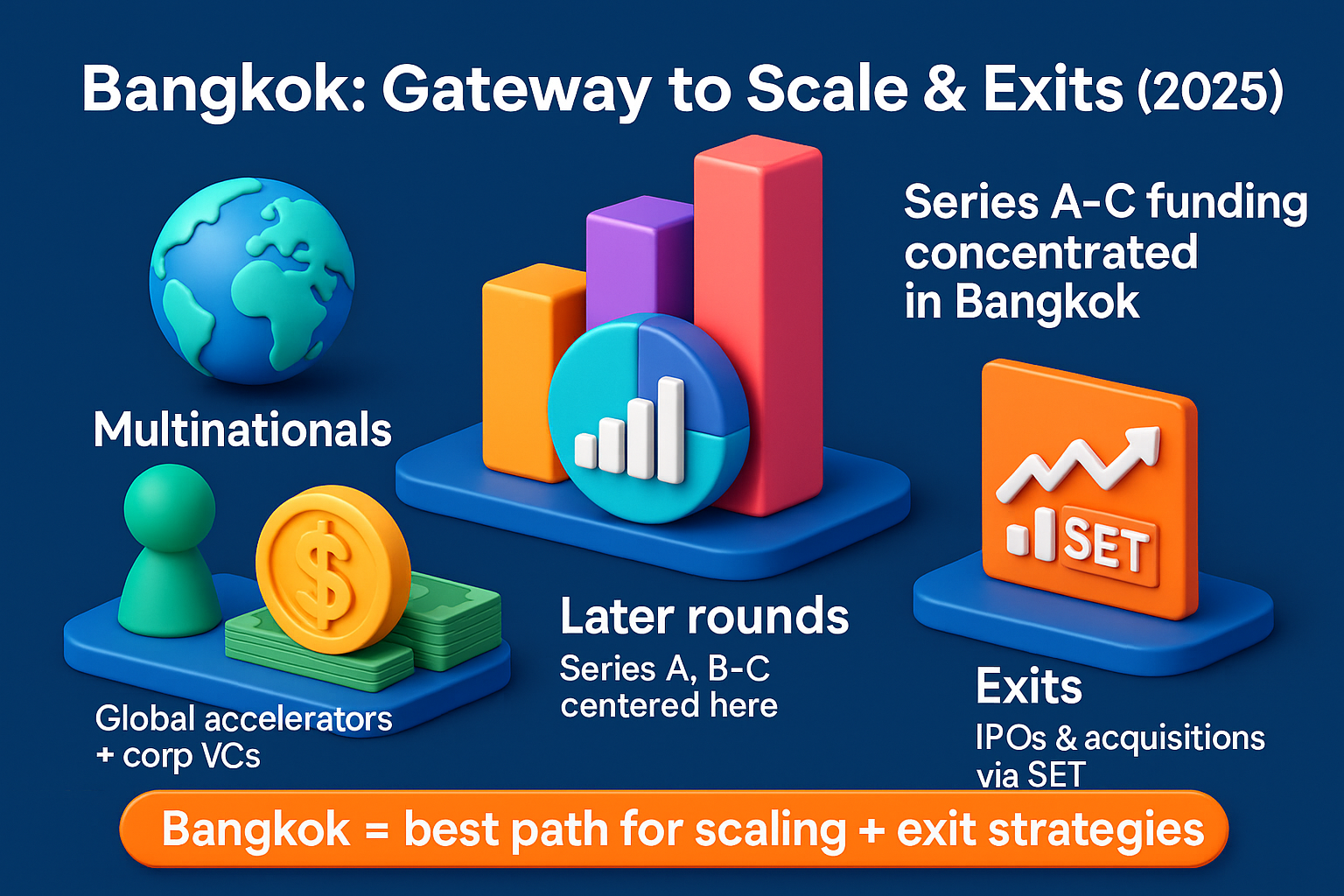
Chiang Mai: Sustainability Over Speed
Chiang Mai offers scalability, but at a smaller scale. The city is better suited for startups prioritizing sustainable growth, niche markets, or lifestyle-driven businesses. Bootstrapped founders can build profitable companies here, but large-scale exits and IPO paths are rare.
For startups aiming to dominate global markets, Chiang Mai requires a hybrid approach – building the core team locally while using Bangkok or Singapore as an investor-facing hub. This allows startups to enjoy Chiang Mai’s low-cost structure while still gaining exposure to exit opportunities elsewhere.
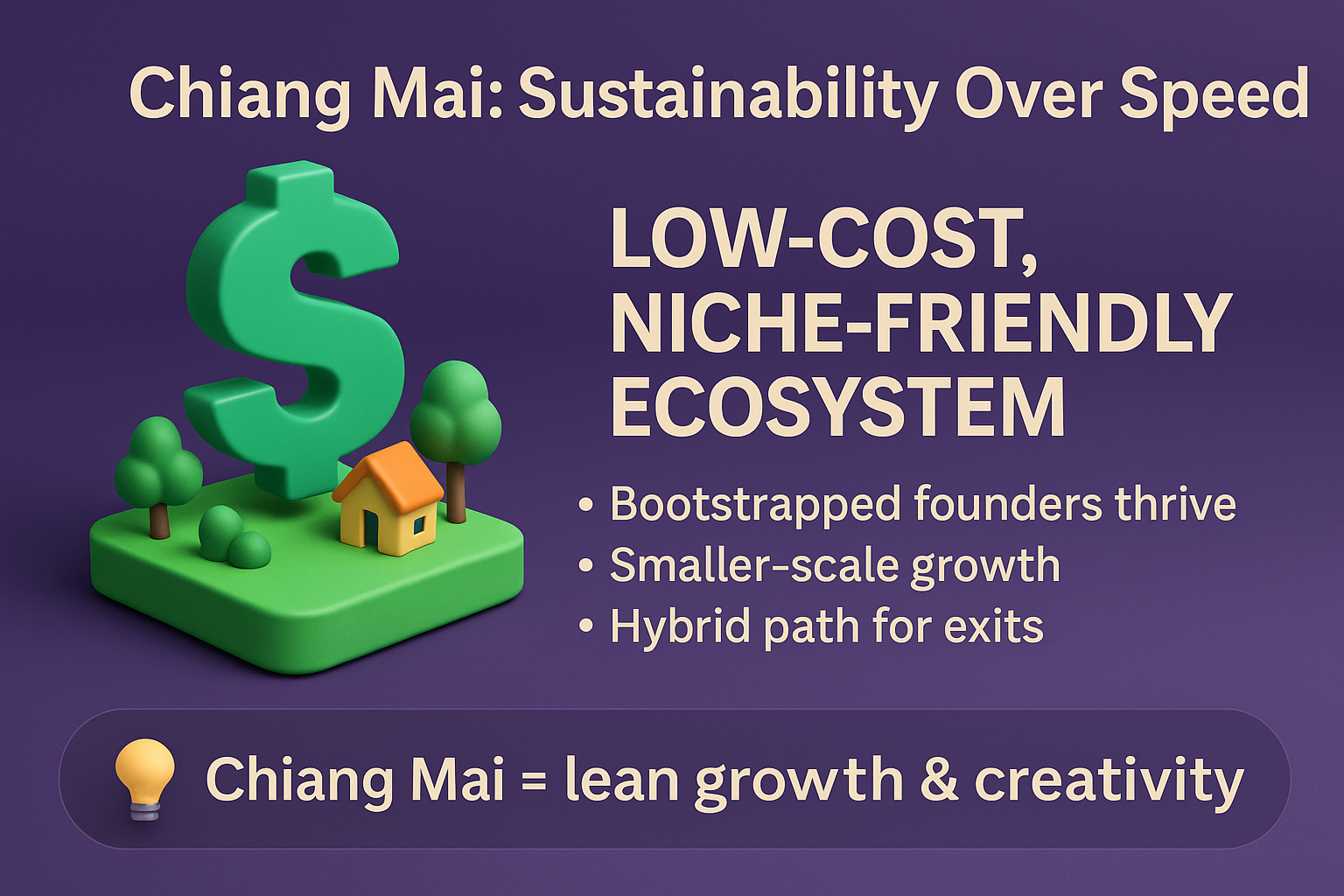
Which Ecosystem Fits Your Exit Strategy?
In 2025, the real cost of building in Bangkok vs Chiang Mai comes down to scalability and exit goals. Bangkok supports founders with ambition for rapid scale, international expansion, and institutional funding, while Chiang Mai suits founders prioritizing longevity, loyalty, and creative independence.
How aboveA Helps Startups in Bangkok and Chiang Mai?
When comparing the real cost of building a startup in Bangkok vs Chiang Mai, founders often overlook the role of the right growth partner. That’s where aboveA stands out. In 2025, aboveA is more than just a digital agency; it is a growth partner offering marketing, martech, and incubation programs designed for early-stage and scaling startups.
Why aboveA Matters in Bangkok?
Bangkok is a competitive, high-cost environment. Founders need visibility fast to stand out in crowded markets. aboveA helps startups in Bangkok by delivering:
International SEO strategies to compete beyond Thailand.
Performance tracking and lead generation systems that reduce wasted ad spend.
Marketing automation and AI-powered tools that improve efficiency.
Strategic consulting on scaling and investor readiness is critical in Bangkok’s fast-moving ecosystem.
This means startups can reduce customer acquisition costs, shorten sales cycles, and present themselves more effectively to investors. Unlike traditional agencies that only focus on ads, aboveA combines data-driven growth marketing with strategic market entry support.
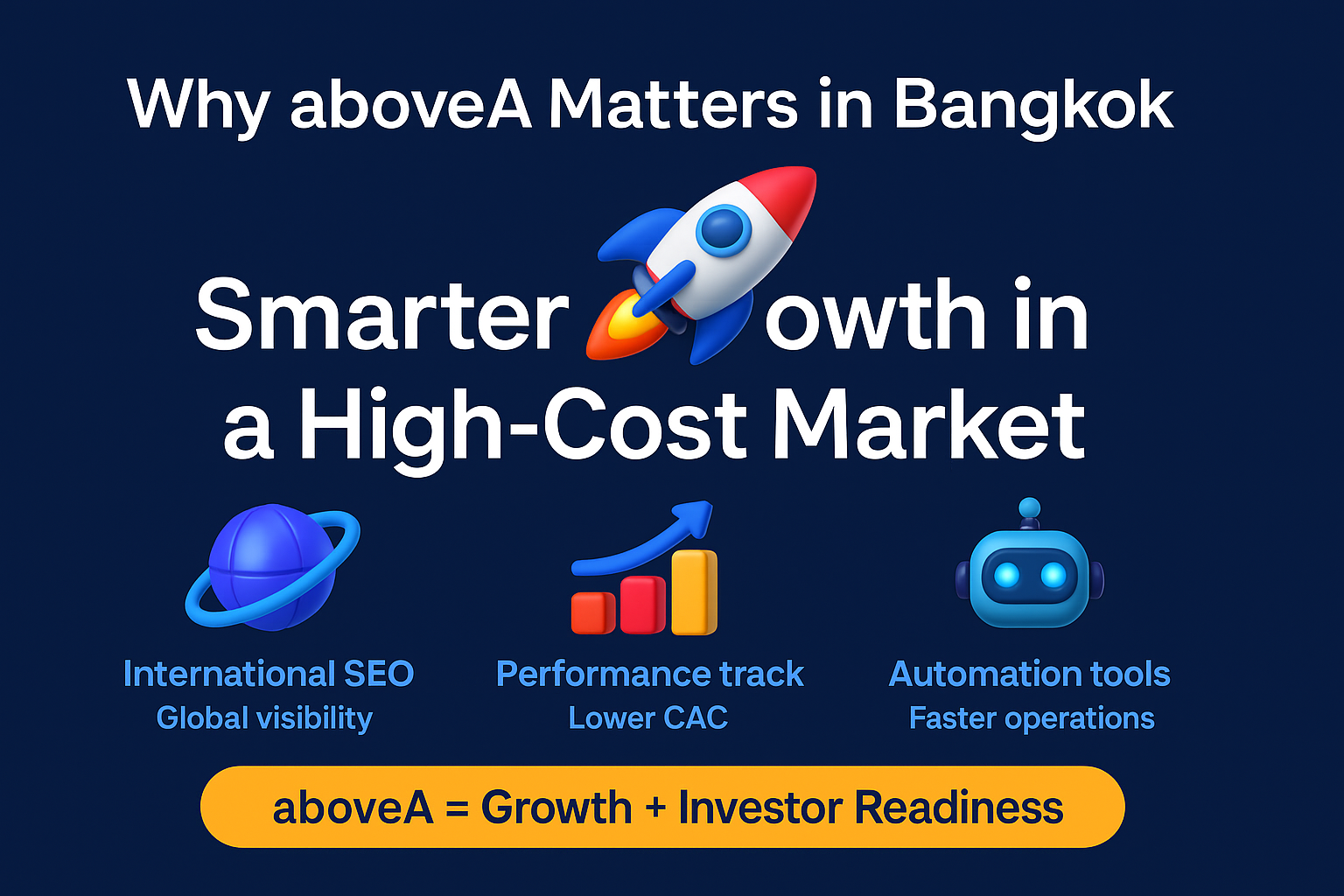
Why aboveA Matters in Chiang Mai?
Chiang Mai startups often prioritize sustainability, lifestyle, and stretching their runway. aboveA’s approach fits perfectly by offering:
Affordable, scalable marketing systems that adapt to lean budgets.
Ecommerce integrations and UX-focused design to convert global audiences.
Community-driven growth strategies that match Chiang Mai’s culture of collaboration.
Incubator and academy programs to help founders build business models while keeping costs low.
With aboveA, Chiang Mai founders don’t have to compromise between affordability and professionalism. They get access to the same high-level growth systems used in Bangkok and abroad, without the overhead.
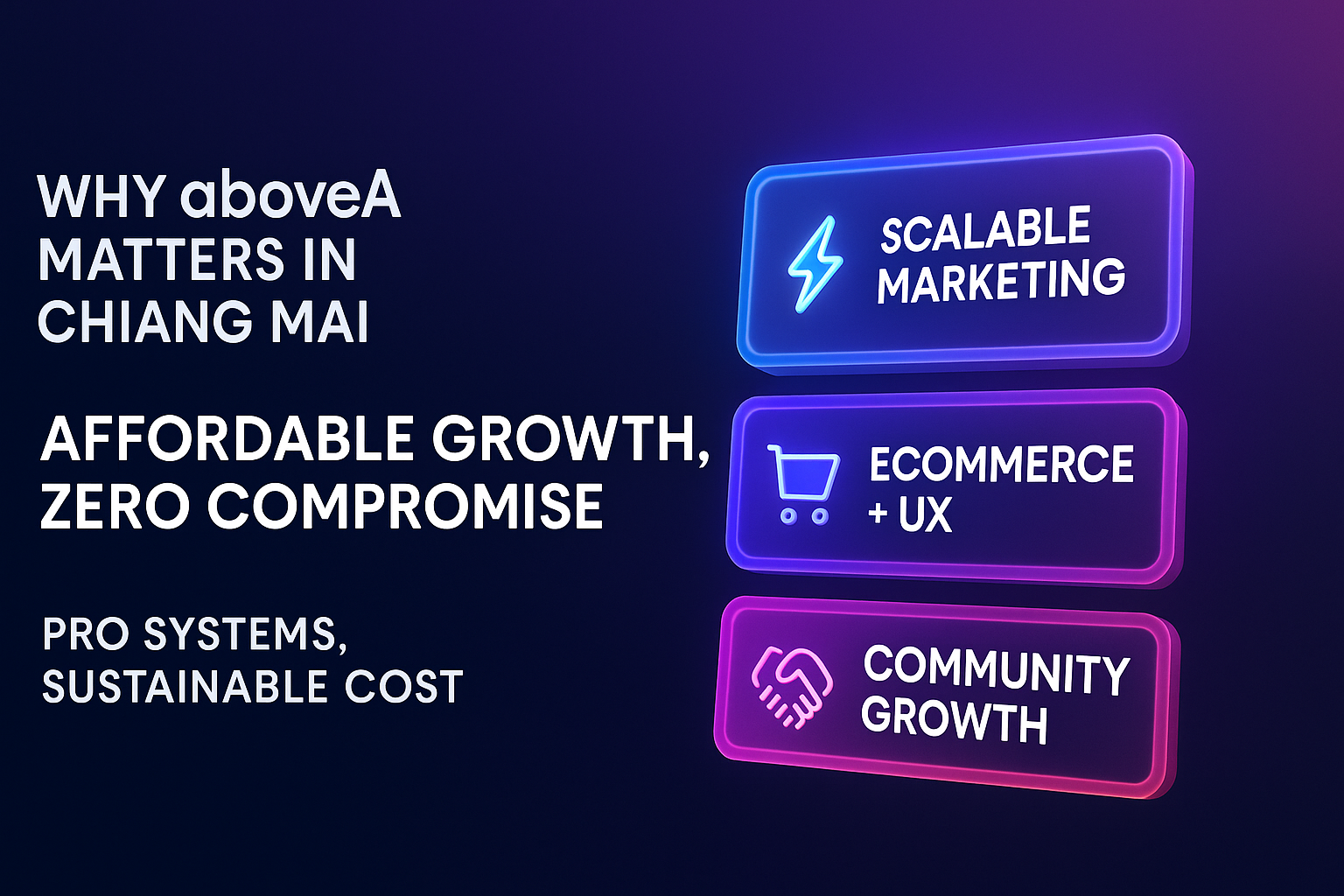
How aboveA Compares to Others?
Most agencies in Thailand focus only on execution – SEO, ads, or social campaigns. Few offer a holistic partnership combining marketing, strategy, and incubation support. aboveA bridges this gap, providing startup incubator programs, capital guidance, and marketing execution under one roof.
| Feature / Program | aboveA | Typical Bangkok Agency | Typical Chiang Mai Agency |
|---|---|---|---|
| SEO & International Expansion | ✅ | ✅ | Limited |
| Growth Marketing Systems | ✅ | Limited | ❌ |
| Startup Incubator & Academy | ✅ | ❌ | ❌ |
| Capital & Investor Support | ✅ | Limited | ❌ |
| Scalable Pricing for Startups | ✅ | ❌ | ✅ |
Why aboveA Is the Better Choice?
In 2025, startups in Thailand don’t just need marketing execution – they need a partner who understands investor expectations, scaling challenges, and lean growth models. aboveA provides the balance between Bangkok’s competitive edge and Chiang Mai’s affordability. Founders can scale faster, attract investors sooner, and reduce the real cost of trial-and-error.
Conclusion
The real cost of building a startup in Bangkok vs Chiang Mai in 2025 comes down to priorities. Bangkok offers speed, scale, and access to investors, while Chiang Mai provides affordability, creativity, and lifestyle advantages. Founders must weigh financial costs against cultural fit and long-term goals. For those seeking both growth and sustainability, working with a partner like aboveA ensures startups don’t face these choices alone. With tailored strategies, incubator programs, and marketing expertise, aboveA helps founders turn local opportunities into global wins – making the path to growth more efficient and sustainable in either city.
Frequently Asked Questions
What are the main cost differences between building a startup in Bangkok and Chiang Mai?
Bangkok has higher salaries, rent, and marketing costs, while Chiang Mai offers affordability, creative talent, and lower overheads. The choice depends on scalability, investor access, and team needs.
Is Bangkok better than Chiang Mai for raising startup funding in 2025?
Yes, Bangkok offers better access to VCs, accelerators, and investor networks. Chiang Mai’s funding ecosystem is smaller, but angel investors and community-driven opportunities suit early-stage creative startups.
Which city is better for international startup founders moving to Thailand?
Bangkok provides global connectivity, corporate partnerships, and established infrastructure. Chiang Mai offers lifestyle affordability, digital nomad communities, and creative culture, making it ideal for sustainable and remote-first startup models.
Can startups in Chiang Mai still scale to international markets?
Yes, but many adopt hybrid models – building core teams in Chiang Mai while leveraging Bangkok or Singapore for investor relations, scaling infrastructure, and international growth opportunities.

